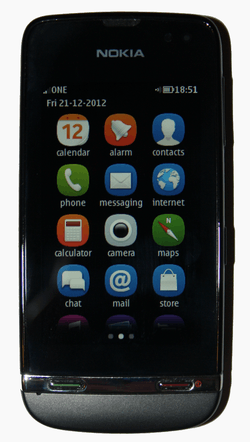Nokia Asha 311
 | |
| Manufacturer | Nokia |
|---|---|
| Series | Full Touch |
| Compatible networks |
|
| Availability by country | Global |
| Form factor | Full Touch candybar |
| Dimensions |
• Width: 52 mm • Height: 106 mm • Thickness: 12.9 mm |
| Weight | 95 g |
| Operating system | Nokia Asha Series 40 OS |
| CPU | 1 GHz ARM11 |
| Memory |
• 128 MB RAM • 256 MB ROM |
| Storage | 256 MB ROM memory (140 MB available to end user) |
| Removable storage | up to 32 GB microSDHC |
| Battery |
|
| Data inputs |
|
| Display | 240 x 400 px (WQVGA), 3.0", 18 bits |
| Rear camera | 3.2 MP (CMOS sensor) EDoF |
| Front camera | No |
| Connectivity |
|
| Development status | Available |
The Nokia Asha 311 is a "Full Touch" smartphone powered by Nokia's Series 40 operating system. It was announced at Bangkok by Nokia along with two others Asha Full Touch phones - the Nokia Asha 305 and 306. The 311 is considered to be the flagship of the Asha Full Touch family. Its main features are the Full Touch capacitive touchscreen, the pentaband 3G radio, SIP VoIP over 3G and Wi-Fi[1] and the ability to play games. Nokia Asha 311 is available in a number of languages depending on which territory it's marketed for. Models sold in South Asia support at least seven languages: English, Hindi, Tamil, Kannada, Telugu, Malayalam and Bengali.
History and availability
The Nokia Asha 311 was announced at Bangkok by Nokia. It was made available 3Q in 2012 globally. The phone was sold at a price of €92 subject to taxes and subsidies.
Hardware
Processors
The Nokia Asha 311 is powered by a 1 GHz processor and includes 128 MB of low power single channel RAM (Mobile DDR).
Screen and input
The Nokia Asha 311 has a 3.0-inch capacitive touchscreen (multi point) with a resolution of 240 x 400 pixel (QVGA). According to Nokia it is capable of displaying up to 262 thousand colors.
The back camera has an extended depth of field feature (no mechanical zoom), no flash and has a 4× digital zoom for both video and camera. The sensor size of the back camera is 3.2-megapixel (2048 x 1536 px), has a f/2.8 aperture and a 50 cm to infinity focus range. It is capable of video recording at up to 640 x 480 px at 15 fps with mono sound.
Buttons
Two physical "call" and "end" keys are positioned on the face of the device. The right side of the device hosts the volume rocker and lock/unlock button.
Battery and SIM
The battery life of the BL-4U (1100 mAh) as claimed by Nokia is 7.2 hours of talk time, from 711 to 781 hours of standby and 40 hours of music playback depending on actual usage.
The SIM card is located under the battery which can be accessed by removing the back panel of the device. No tool is necessary to remove the back panel.
Storage
The phone has 140 MB of available non-removable storage. Additional storage is available via a microSDHC card socket, which is certified to support up to 32 GB of additional storage.
Software
The Nokia Asha 311 is powered by Nokia Series 40 Full Touch operating system and comes with a variety of applications:
- Web: Nokia (proxy) Browser for Series 40
- Conversations: Nokia Messaging Service 3.2 (instant messaging and e-mail) and SMS, MMS
- Media: Camera, Photos, Music player, Nokia Music Store (on selected market), Flash Lite 3.0 (for YouTube video), Video player
- Personal Information Management: Calendar, Detailed contact information
- Utilities: VoIP, Notes, Calculator, To-do list, Alarm clock, Voice recorder, Timer
The device comes with Nokia Maps for Series 40 and make use of cellular network for positioning as there is no GPS in the phone. Nokia Maps for Series 40 phones does not provide voice-guided navigation and only allows for basic route (< 10 km) to be planned. The software will provide step-by-step instructions, allows the user to see the route on a map, and search for nearby points of interest. Depending on where the phone was purchased, regional maps (Europe, South America, etc.) are preloaded, and as such, an active Internet connection to download map data is not required.
See also
References
- ↑ "VoIP support in Nokia devices - Nokia Developer Wiki". Nokia. Retrieved 10 June 2012.
External links
| |||||||||||||||||||||||||||||||||||||||||